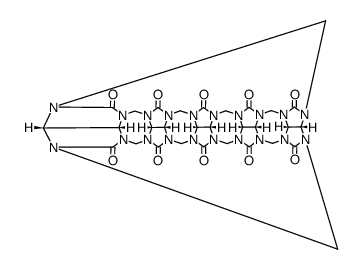259886-49-2
| 中文名 | 葫芦[5]脲 |
|---|---|
| 英文名 | cucurbit[5]uril |
| 英文别名 |
cucurbit(5)uril free base
MFCD03456499 cucurbit[5]uril (cb[5]) ammonium sulfate hydrate |
| 分子式 | C30H30N20O10 |
|---|---|
| 分子量 | 830.68700 |
| 精确质量 | 830.24500 |
| PSA | 235.50000 |
| 储存条件 | 存放在密封容器内,并放在阴凉,干燥处。 |
| 稳定性 | 指定条件下稳定,远离氧化物。 |
| 计算化学 | 1、 疏水参数计算参考值(XlogP): 2、 氢键供体数量: 3、 氢键受体数量: 4、 可旋转化学键数量: 5、 拓扑分子极性表面积(TPSA): 6、 重原子数量: 7、 表面电荷: 8、 复杂度: 9、 同位素原子数量:0 10、 确定原子立构中心数量:0 11、 不确定原子立构中心数量:0 12、 确定化学键立构中心数量:0 13、 不确定化学键立构中心数量:0 14、 共价键单元数量:1 |
| 更多 | 1. 性状:固体。 2. 密度(g/mL,25/4℃):未确定 3. 相对蒸汽密度(g/mL,空气=1):未确定 4. 熔点(ºC):未确定 5. 沸点(ºC,常压):未确定 6. 沸点(ºC,5.2kPa):未确定 7. 折射率:未确定 8. 闪点(ºC):未确定 9. 比旋光度(º):未确定 10. 自燃点或引燃温度(ºC):未确定 11. 蒸气压(kPa,25ºC):未确定 12. 饱和蒸气压(kPa,60ºC):未确定 13. 燃烧热(KJ/mol):未确定 14. 临界温度(ºC):未确定 15. 临界压力(KPa):未确定 16. 油水(辛醇/水)分配系数的对数值:未确定 17. 爆炸上限(%,V/V):未确定 18. 爆炸下限(%,V/V):未确定 19. 溶解性:未确定 。 |
|
Section 1: Product Identification Chemical Name:Cucurbit[5]uril (CB[5]) ammonium sulfate hydrate, 99+% CAS Registry Number:259886-49-2 Formula:C30H30N20O10.(NH4)2SO4.xH2O EINECS Number:none Chemical Family:macrocyclic compounds Synonym:CB[5]
Section 2: Composition and Information on Ingredients IngredientCAS NumberPercentACGIH (TWA)OSHA (PEL) Title compound259886-49-287%no datano data Ammonium sulfate7783-20-213%no datano data Section 3: Hazards Identification Emergency Overview:Irritating to skin, eyes and respiratory tract. Primary Routes of Exposure:Ingestion, inhalation, eyes Eye Contact:Causes slight to mild irritation of the eyes. Skin Contact:Causes slight to mild irritation of the skin. Inhalation:Irritating to the nose, mucous membranes and respiratory tract. Ingestion:No information available on the physiological effects of ingestion. May be harmful if swallowed. Acute Health Affects:Irritating to skin, eyes and respiratory tract. Chronic Health Affects:No information on long-term chronic effects. NTP:No IARC:No OSHA:No SECTION 4: First Aid Measures Immediately flush the eyes with copious amounts of water for at least 10-15 minutes. A victim may need Eye Exposure: assistance in keeping their eye lids open. Get immediate medical attention. Wash the affected area with water. Remove contaminated clothes if necessary. Seek medical assistance if Skin Exposure: irritation persists. Remove the victim to fresh air. Closely monitor the victim for signs of respiratory problems, such as difficulty Inhalation: in breathing, coughing, wheezing, or pain. In such cases seek immediate medical assistance. Seek medical attention immediately. Keep the victim calm. Give the victim water (only if conscious). Induce Ingestion: vomiting only if directed by medical personnel. SECTION 5: Fire Fighting Measures Flash Point:none Autoignition Temperature:none Explosion Limits:none Extinguishing Medium:carbon dioxide, dry powder or foam If this product is involved in a fire, fire fighters should be equipped with a NIOSH approved positive pressure Special Fire Fighting Procedures: self-contained breathing apparatus and full protective clothing. Hazardous Combustion andIf involved in a fire this material may emit irritating fumes. Decomposion Products: Unusual Fire or Explosion Hazards: No unusual fire or explosion hazards. SECTION 6: Accidental Release Measures Spill and Leak Procedures:Small spills can be mixed with vermiculite or sodium carbonate and swept up. SECTION 7: Handling and Storage Handling and Storage:Store in a tightly sealed container. Keep in a cool, dry, well-ventilated area. SECTION 8: Exposure Controls and Personal Protection Eye Protection:Always wear approved safety glasses when handling a chemical substance in the laboratory. Skin Protection:Wear protective clothing and gloves. Ventilation:Handle the material in an efficient fume hood. If ventilation is not available a respirator should be worn. The use of respirators requires a Respirator Respirator: Protection Program to be in compliance with 29 CFR 1910.134. Ventilation:Handle the material in an efficient fume hood. Additional Protection:No additional protection required. SECTION 9: Physical and Chemical Properties Color and Form:white powder Molecular Weight:962.83 Melting Point:no data Boiling Point:no data Vapor Pressure:no data Specific Gravity:no data Odor:none Solubility in Water:insoluble SECTION 10: Stability and Reactivity Stability:air and moisture stable Hazardous Polymerization:no hazardous polymerization Conditions to Avoid:none Incompatibility:oxidizing agents, active metals, strong bases Decomposition Products:carbon monoxide, carbon dioxide and organic fumes. SECTION 11: Toxicological Information Title compound: No information available in the RTECS files. Ammonium sulfate: Oral (man); TDLo: 1500 RTECS Data:mg/kg. Oral (rat); LD50: 2840 mg/kg. Oral (mouse); LD50: 640 mg/kg. Intraperitoneal (mouse); LD50: 610 mg/kg. Oral (mammal-domestic); LDLo: 3500 mg/kg. Carcinogenic Effects:no data Mutagenic Effects:no data Tetratogenic Effects:no data SECTION 12: Ecological Information Ecological Information:No information available SECTION 13: Disposal Considerations Disposal:Dispose of according to local, state and federal regulations. SECTION 14: Transportation Shipping Name (CFR):Non-hazardous Hazard Class (CFR):NA Additional Hazard Class (CFR):NA Packaging Group (CFR):NA UN ID Number (CFR):NA Shipping Name (IATA):Non-hazardous Hazard Class (IATA):NA Additional Hazard Class (IATA):NA Packaging Group (IATA):NA UN ID Number (IATA):NA SECTION 15: Regulatory Information TSCA:Title compound: Not listed in the TSCA inventory. SARA (Title 313):Not regulated under SARA 313 Second Ingredient:Listed in the TSCA inventory. Not regulated under SARA 313. SECTION 16 - ADDITIONAL INFORMATION N/A |
|
生态学数据: 通常对水是不危害的,若无政府许可,勿将材料排入周围环境。
|


